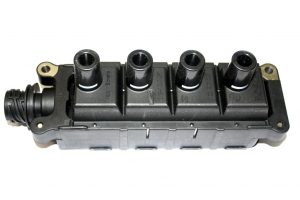
for Audi, BMW, Land Rover, Jaguar, Mercedes,
Mini, Porsche & Volkswagen Repair

for Audi, BMW, Land Rover, Jaguar, Mercedes,
Mini, Porsche & Volkswagen Repair

Once you have had the experience of driving a BMW, there is a chance you may not be interested in any other brand. This is mainly because BMWs are very reliable cars – something every BMW owner can attest to. However, like every other brand, some models are less reliable than others due to certain components that are prone to malfunction. In the BMW 318i, M3 (e90) and X5, that component is the ignition coil.
The ignition coil is responsible for turning low voltage to high-voltage electrical power which is then sent to the spark plugs. This high voltage current sent to the spark plugs ignites the fuel in the engine to power up the car. If the ignition coil of your car is malfunctioning, you may be unable to start your car and/or keep it running smoothly.
A bad ignition coil will give off several warning signs. As the ignition coil is an engine component, one of the first signs of a possibly failing coil is an illuminated check engine light. You may also experience engine misfiring and stalling accompanied by a snapping sound from the engine compartment. Sometimes your car may not start at all.
The spark generated by the ignition coil lights the mixture of fuel and air in the engine causing it to start. If the ignition coil is not working properly, you may experience poor fuel economy as a lot of unburned fuel will be wasted. A malfunctioning ignition coil is capable of damaging the engine of your car and leaving you stranded on the road. Take your car to an auto repair facility immediately you begin to experience any of the above-mentioned signs.
The ignition coil, ignition wires, and spark plugs work hand in hand to fire up the engine, thus if the spark plugs or ignition wires are not working properly, the work output of the coil will definitely be affected. The ignition coil in your engine could also be damaged by oils that leak onto the coils. As such, if there is an oil leak in the engine compartment, especially if the leaking fluid is hot and it is getting to the ignition coils, it wouldn’t take much longer before the coils begin to malfunction.
Also, if there is too much resistance in the wires of the spark plugs, the ignition coil may experience premature failure. Bad ignition coils could, in turn, cause severe damages to your catalytic converter and engine. You should have a mechanic look at your BMW once you suspect a problem before it escalates to a more serious issue that could incur more bills.
Try not to drive your car with a bad ignition system, not only is it dangerous, you could damage other components of your car engine in the process. When you bring in your car suspecting an ignition coil problem, we will first examine and test the components of the ignition system to determine the root cause of the problem.
If the coil is faulty, we will extract and replace the failing ignition coil. Considering the fact that the coils and spark plugs work together, it is always best to change both components at once. However, depending on the system of your BMW, replacing the spark plugs may not be necessary.
All the same, the manufacturers recommend replacing your ignition coils and spark plugs regularly at scheduled intervals. Not only does this greatly reduce the chances of a breakdown, but it will also keep the ignition system of your BMW in superb condition so you can enjoy a smooth drive.
If your BMW is having issues starting or running smoothly, bring it in for an inspection. We have been servicing European vehicles for over 35 years and are proud of our highly rated service by members of the community. To experience our Ignition Service and Repair, schedule your appointment here or contact us here.